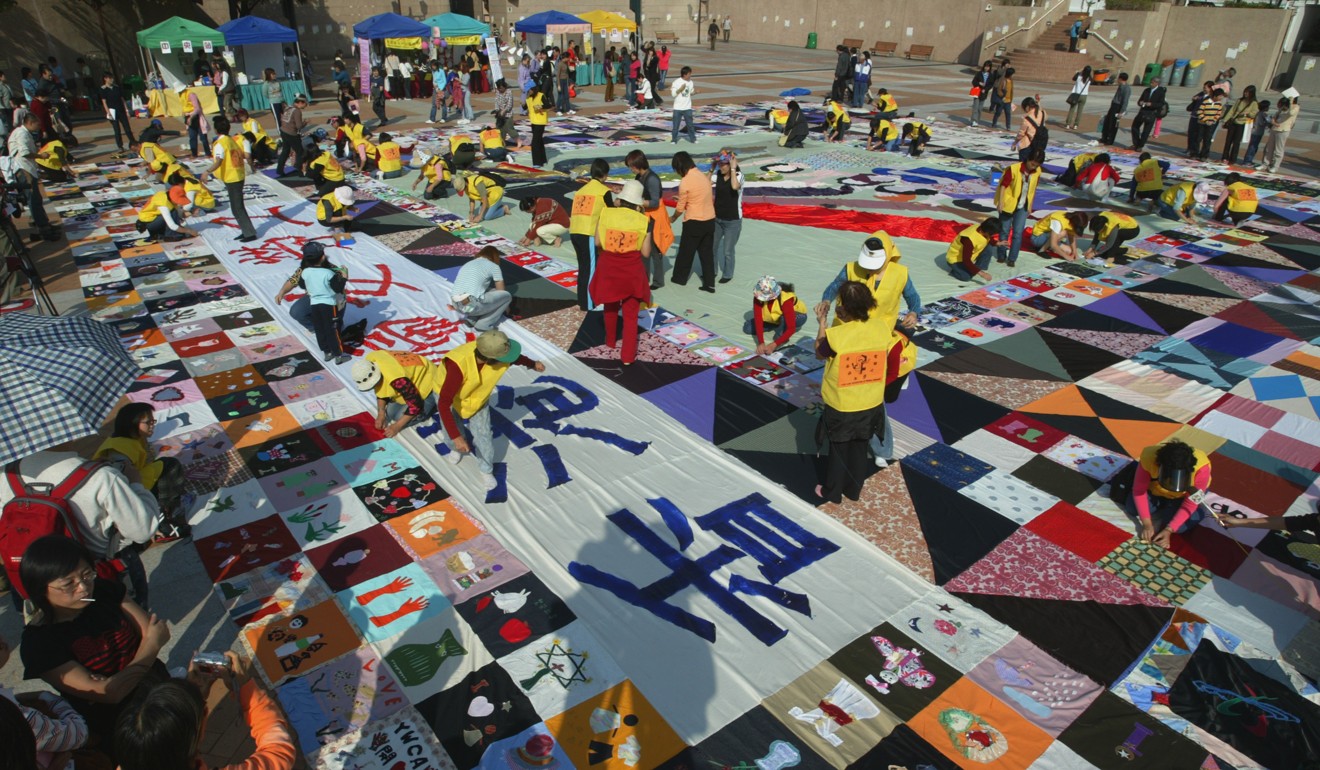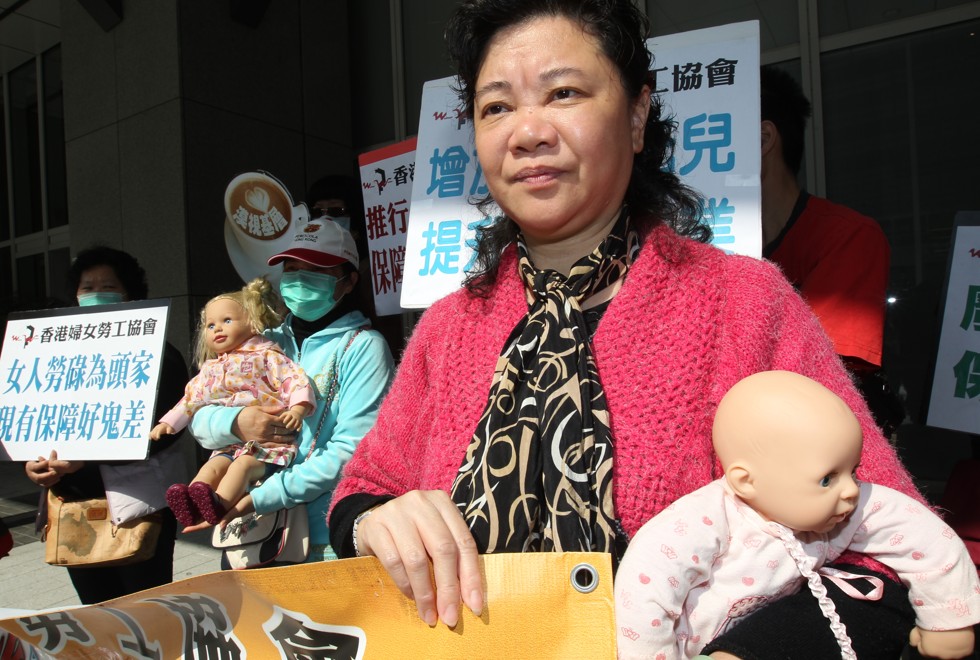
Many Hong Kong women face greater stress as they are squeezed between poorest and better off
Study finds those earning just above the threshold for social security payments are the most stressed, having to balance work with family care obligations
Ms Lam, a 60-year-old Hong Kong cleaner, does not often feel happy about her life.
The stressed-out labourer, who in many ways typifies the city’s working-class women, must balance her job while also taking care of her husband, who suffers from lower back pain, and her mother-in-law and father, who are both in their 90s.
She said when her two 30-something daughters were younger and still living with her, she even vented her frustration by hitting them with sticks and throwing items around at home.
“I sometimes get irritated very easily,” Lam said. “I feel like I can never finish housework, while I have two elderly people and a husband to take care of. Not to mention the fact that I need to work long hours.”
Watch: Jack Ma calls for firms to hire more women
A new study led by the Zonta Club of Hong Kong, a women’s concern group, suggests working-class women like Lam, whose earnings are slightly above the social welfare entitlement threshold and just enough to make a living, are less happy than those receiving government welfare payments.
The club, along with 11 non-governmental organisations in Hong Kong, polled 1,080 working women between November last year and February this year to better understand women’s general well-being
and the potential risk factors affecting their mental health.
Zonta Club of Hong Kong commissioned Dr Timothy So, founder and CEO of Winnovator Group and fellow of Cambridge Wellbeing Institute, to conduct research for the survey.
Respondents were asked to rate their well-being based on several issues including happiness, psychological symptoms including depression and anxiety, resilience and social support.
The club’s advocacy committee chairwoman, Julia Wen Fung Yuet-shan, called the survey a “fact-finding” study.
“We hope the findings can serve as an indicator for policy makers, who can eventually improve the living conditions of low-income working women,” she said.
The study examined how age, marital status, average monthly household income, physical condition and whether the respondent had children with learning disabilities affected workers’ overall well-being.
One of its major findings was that women with a monthly household income of between HK$15,001 and HK$20,000 were actually the least happy, even though they were not the poorest. Their happiness index was 67.15, the lowest among six other income groups in the study.
Those with a monthly household income of less than HK$5,000, the poorest group in the study, scored 71.16 for happiness, five points lower than the richest group earning HK$40,000 or above on 76.57.
The study showed the least happy group was earning just slightly over the social welfare entitlement threshold, suggesting their discontent arises from being squeezed the most financially. But the authors of the study said further research would be needed to explore what sort of difficulties and pressures they were facing.
Social worker Wendy Huang Wenjie agreed those with a monthly household income of between HK$15,001 and HK$20,000 were usually ignored in government policies, as she said the lack of resources and the current political environment made it difficult for officials to launch universal benefits to support them.

The low-income working family allowance, one of the government’s welfare payments, gives a three-person family a full allowance only if monthly family income does not exceed HK$14,300. Non-single-parent families can receive a full basic allowance of HK$600, but only if they work between 144 and 192 hours per month.
“The government focusses on helping the poorest in society as its policies aim at alleviating poverty,” said Huang, who is also a community organiser with the Society for Community Organisation.
“It’s like a form of justice rather than a universal approach. That’s why those who are between the poorest and the richest do not enjoy many benefits. Social welfare, such as universal retirement protection, may help improve the situation of this group of women. But the lack of government resources and the current polarised political environment have made such policies very hard to put in place.
“I think women in this income group are especially stressed because they need to bear surging housing costs and strike a balance between work and family. Some of them may also need to take care of their children and elderly relatives at home. And they have to do all these without any kind of social benefits.”
Meanwhile Ms Wong, a 34-year-old office worker who preferred not to give her full name, said being sandwiched between the poorest and the richest in society felt like she had to constantly struggle to keep her head above water.
As a divorcee,she said she was struggling to raise her seven-year-old daughter and five-year-old son alone. She said she could barely save any money, as she was in the HK$15,001 to HK$20,000 income group. She said she was struggling to pay for her children’s tuition fees.
Wong said she had approached the Social Welfare Department for help, but it could only provide counselling services, as her income meant she did not qualify for any social welfare schemes.
“It feels like I am struggling to stay afloat in the water but the person sitting in a boat who is supposed to help me is only ticking boxes on a checklist to see if I am qualified to be saved,” she said of her experience with the department.
To help working women like Wong, Huang said the government should introduce more policies that cater to women’s needs, such as enhancing childcare services and encouraging more employers to adopt family-friendly employment practices.
Commenting on the overall impact this situation has on society, assistant professor Ivy Wong Wang of the department of psychology at the University of Hong Kong said if working women continued to be less happy and less satisfied with their lives, there would be more family conflict. And in the end companies could suffer from higher staff turnover due to low work satisfaction associated with mental health problems.
She added that in looking at the bigger picture, declining staff morale would essentially hurt the city’s GDP, and ultimately there would be a heavier burden on public medical services.
But Ivy Wong stressed that those living between the poorest and the richest would need more mental health support from the community and the government, rather than welfare payments.
She said other academic research had shown that wealth only increased happiness up to a certain level, and then it would level off.
“Higher income and better living conditions do not always mean greater happiness,” she said. “We are earning more and live way better than our ancestors, but life satisfaction has not increased accordingly over the years. Poverty is associated with many stresses, such as fewer life choices, poorer health and financial burdens.”
She said the government should increase funding for tertiary occupational psychology and counselling programmes as well as encourage on-site counselling services at work.
Ivy Wong said it should also ensure companies provided gradual reintegration into society and a good sick leave pay scheme for staff with mental health challenges.
“Especially given the current long working hours in the city, the government should set up policies that ensure more reasonable and more flexible working hours and work modes and provide better childcare services,” she said. “These policies will improve work-life balance and allow employees to carry out other roles and enjoy their social life, all of which are known to increase overall personal satisfaction.”


